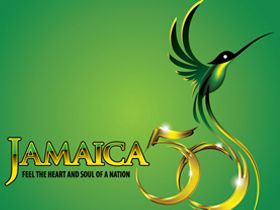Jamaica's music was, and still is, a political tool, representing the mood of a particular era, emphasizing socio-political issues, giving a voice to the masses, providing an avenue through which they could air their frustrations, giving voice to issues which plagued them. The history of Jamaica's music has been synchronized with the history of the Jamaican people, as is evidenced in the African influences such as the one-drop rhythm and the patois style, a creole language which has both African and English linguistic features, in which most of the songs are sung. The European elements must also be mentioned, originating from the colonial era where slave musicians had to play European popular music for their masters, resulting in an influx of various song and dance styles.
Since the post-Independence period, as the nation has undergone its fair share of evolution, so has the music – the beats have changed, the tempo has gone up and down, but the rhythm of Jamaican music, the heartbeat of the island, plays on.
Ska, Ska, Ska
Jamaica's post-independent period was an era accentuated by social issues, a time during which ska music, which featured an upbeat tempo, jazz-infused riffs and rhythms made for dancing, was at its peak. Bob Marley and the Wailers produced Simmer Down in 1963, while Millie Small scored the first worldwide ska hit in 1994 with the sweet and playful, My Boy Lollipop. At the helm of the 'ska movement' were the Skatalites, a group of notable former jazz players, who turned out Ball O' Fire in 1965, Phoenix City in 1966 and Guns of Navarone, an instrumental, in 1967. Another star of the ska era, perhaps its prince, was Desmond Dekker (Dacres), who paid homage to the Jamaican 'rude boy' with 007 Shanty Town and Rude Boy Train in 1967, then increased the tempo a year later in Israelites. The rude boy culture was once again an example of the music typifying the lifestyle, with Jamaican ghetto youths practicing a culture synonymous with that of the old-school American-style gangster.
Get Ready, Let's Do Rocksteady
During the mid-1960's, the ska movement evolved into what became known as rock steady – the main difference between the two being a slower beat and no horn section in the latter. Rock steady, named after Alton Ellis' hit Rock Steady (1966), was characterized by its very laid-back, almost lazy yet mellow style. Vocal groups such as the Wailers, the Maytals and the Heptones, found their voices, as vocal harmonies became the predominant feature of the music during this period. Some of the more popular hits of this short-lived genre included John Holt's The Tide Is High (1966) by the Paragons, Judge Dread (1967) by Prince Buster, and Rivers Of Babylon (1969) by the Melodians.
This Is Reggae Music
In the late 1960's, rocksteady quickly morphed into reggae music, the genre of music which has become synonymous with Jamaica, and which catapulted the nation into the musical stratosphere. Early reggae music featured very heavily the influences of Rastafarianism, which had its own infusion of African-inspired distinctness, such as nyabinghi drumming. The heroes of reggae music include icon Bob Marley, Peter Tosh, and Lee 'Scratch' Perry. Messages in the music during this time continued to focus on social issues such as the country's impoverished conditions, particularly in the ghettos.
Dancehall Music
The emergence of dancehall music took place in the late 1970s. It was a more updated version of reggae music, and like reggae, reflected socio-political issues such as poverty and violence. Dancehall exists today as a modern genre, with deejays using the music to lash out at each other at times, but predominantly at issues which they don't advocate such as violence, especially against women and children, and homosexuality. Some of the recognized names in dancehall from its inception to present day include Shabba Ranks, Buju Banton, Beenie Man, Bounty Killa, Vybz Kartel and Mavado.
Jamaican Music – To Di Worl'
The popularity of Jamaica's music is undeniable, its influences seen the world over. It is featured in movies and on international music charts, and inspires the music produced by artistes in other countries. Jamaican music has won awards on the world stage on numerous occasions, proving its deep entrenchment in world music culture. Artistes such as Sean Paul have crossed over into other genres such as hip-hop, fusing Jamaican dancehall with up-tempo pop beats, and having great success on the world stage as a result. It is now a common practice for dancehall acts to collaborate with artistes on the world stage, re-emphasizing that out of this little rock, continues to flow smooth, sweet melodies; songs that make the world rock away.













 less
less
 more
more